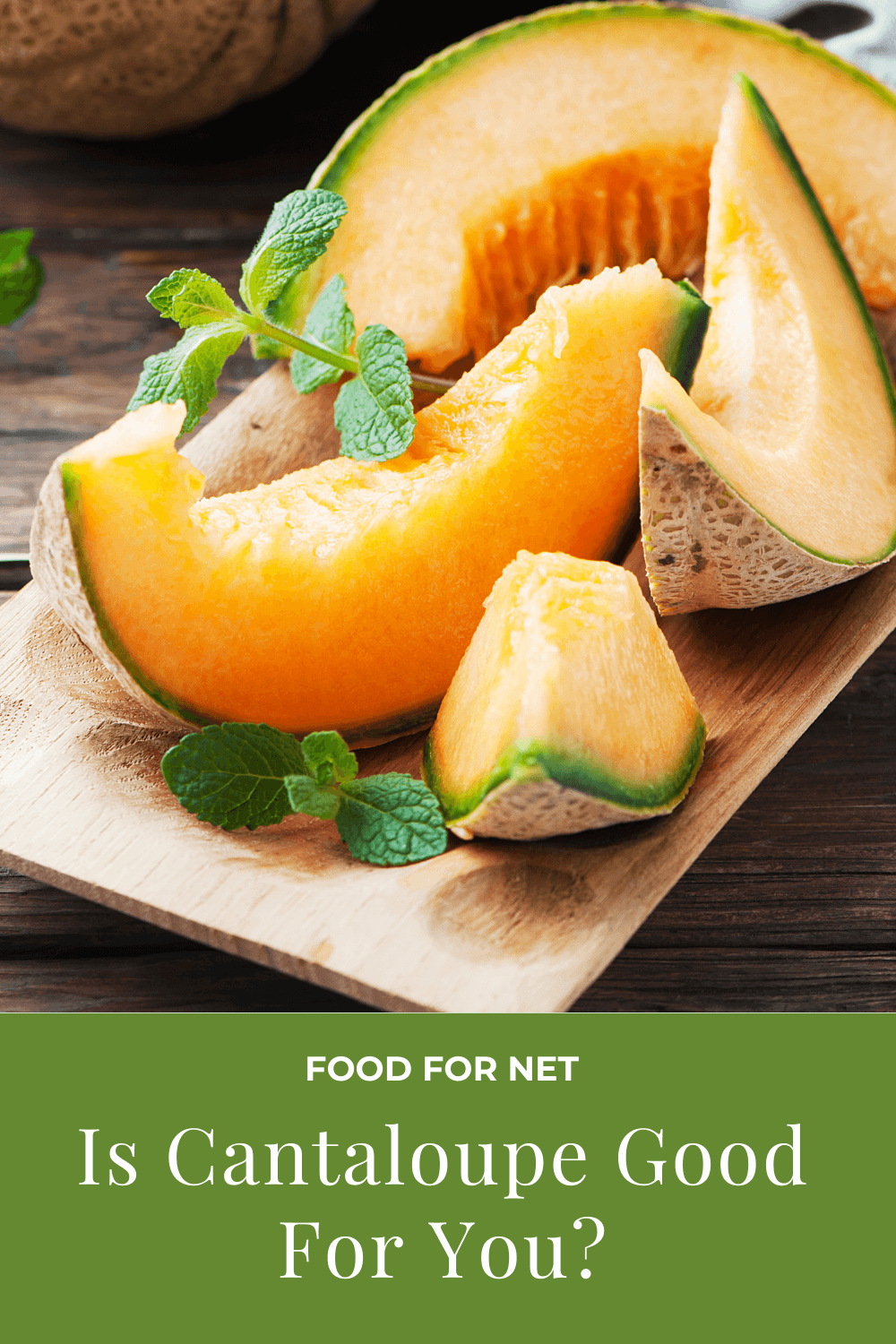
Let’s be honest, cantaloupes aren’t the most exciting type of fruit. Pieces of cantaloupe often get left to one side in favor of their summertime cousin watermelon (or just about any other type of fruit, for that matter). Yet, while cantaloupe might seem boring at times, it is also a refreshing and surprisingly tasty choice. This raises an important question then, is cantaloupe good for you?
After all, flavor isn’t the only reason that we eat fruit. We want to know that we’re getting some benefits from doing so too. In this post, then, we’re taking a close look at cantaloupe, including where this type of fruit shines and where it doesn’t do so well.
Is Cantaloupe Good For You?
- Benefits of Cantaloupe
- The Problems With Cantaloupe
- Interesting Ways To Use Cantaloupe
- Can You Eat Cantaloupe Seeds?
- Final Thoughts
Benefits Of Cantaloupe
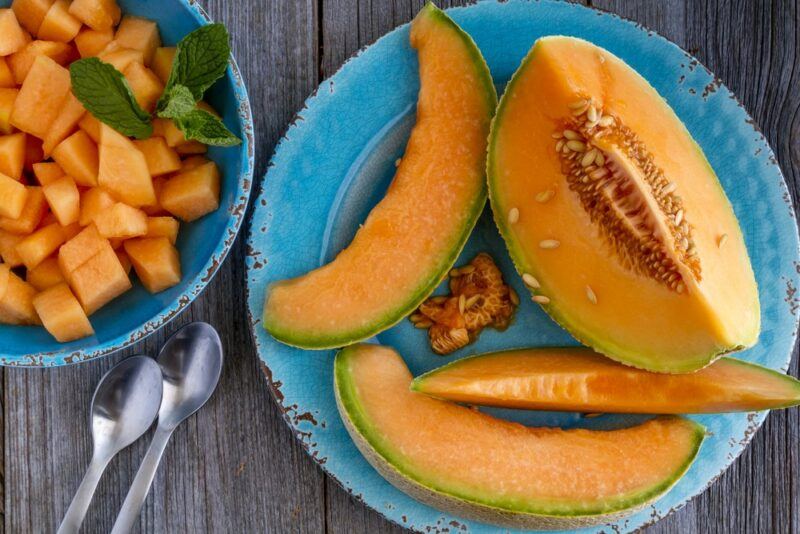
The Amount Of Sugar
Sugar is a common feature in fruit, but some types of fruit are better than others. Cantaloupe is a particularly good choice, with 100 grams of the melon containing just 7.9 grams of sugar.
Cantaloupe even ends up being low enough in sugar that it will fit onto many low carb diets. This is an incredibly important outcome.
After all, fruit offers a variety of important antioxidants and plant-based compounds. To get these, you should be eating some fruit regularly, even on a low carb diet.
A Decent Source Of Vitamin A And Vitamin C
Cantaloupe isn’t particularly nutrient dense, but it does offer some important nutrients, including vitamin A and vitamin C.
In fact, a cup of cantaloupe balls contains 120% of your daily vitamin A intake and 108% of your vitamin C intake. This is extremely impressive, given that you’re only getting 60 calories in that serving size.
There are some other nutrients present too, including potassium, folate, vitamin K, and magnesium. The quantities of these aren’t nearly as high, but each individual nutrient still helps with your total daily needs.
The vitamin C is particularly interesting – and we’re not just talking about immune system benefits either. Vitamin C can also help you to absorb iron from plant-based foods. So, if you’re having cantaloupe as part of a fruit and vegetable salad, you’re going to absorb more iron than you would otherwise.
Offers Plenty Of Antioxidants, Including Beta Carotene

Beta carotene is a famous pigment molecule, one that gives carrots their bright orange color and is responsible for many of their benefits. There’s a decent amount of beta carotene in cantaloupe too, more than in most orange fruit.
Beta carotene has two main functions in our bodies. The first is that it can be converted to vitamin A – a vitamin that we need for our skin and eye health (it has many other roles in our bodies too).
Second, beta carotene can act as an antioxidant, along with some other compounds in cantaloupe.
Antioxidant effects may be crucial to our health. They provide protection against some of the damage that free radicals do, decreasing our risk of disease in the process.
The Water Content
Cantaloupe is more water than anything else (it’s close to 90% water). High water content fruits can be powerful, as they help to keep you hydrated.
As we all know, water is crucial.
We can’t survive more than a few days without it, as water plays so many roles throughout our body, helping with our blood pressure, kidneys, digestion, and heart health.
While a glass of water will hydrate you more than a piece of cantaloupe, cantaloupe is still effective for staving off dehydration. Besides, sometimes it’s easier to eat a piece of fruit than to drink a glass of water.
You Get Some Fiber
Cantaloupe isn’t an amazing source of fiber, but it does provide you with some. A cup of cantaloupe balls, for example, contains roughly 1.6 grams of fiber.
This fiber is vital, as we need fiber to keep our digestive systems working well. Plus, many of us aren’t getting enough fiber. Fruits like cantaloupe are a nice and easy way to increase fiber intake.
The water content of cantaloupe is helpful here too, as having too much fiber and not enough water can lead to significant side effects. Getting fiber and water from the same piece of food should drop your risk of side effects considerably.
Could Help With Weight Loss
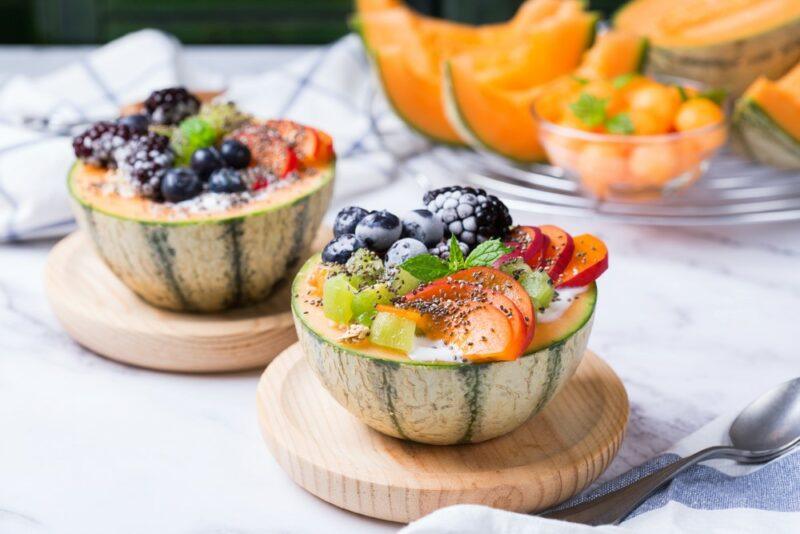
Cantaloupe is a great choice for weight loss, as it is low in calories, contains less sugar than many other types of fruit, and is rich in water. There’s some fiber in the mix as well.
The combination of water and fiber is particularly powerful, making cantaloupe a surprisingly filling snack.
Even the sugar in cantaloupe could be helpful. Rather than trying to ignore your sugar cravings entirely, it’s often better to find healthy ways to satisfy them. Cantaloupe is one such approach, as you’re eating a natural food that doesn’t contain too much sugar.
A Low Acid Fruit
While fruit is always somewhat acidic, cantaloupe is a better choice than most. Indeed, cantaloupe, watermelon, and honeydew are all low acid fruits.
Their low acidity makes these fruits perfect for anyone with acid reflux.
It’s not just that the low acidity stops cantaloupe from triggering acid reflux symptoms either. Eating low acid fruit regularly might actually help with acid reflux, as the antioxidants and fiber in fruit help your digestive system to function well.
The trick is to keep your portions small and pay close attention to your trigger foods. You might find that you can eat cantaloupe and watermelon without a problem, while mangos (another low acid fruit) could be a problem.
The Problems With Cantaloupe
It Often Isn’t Very Good
Cantaloupe seems to be one of the least liked fruits ever. It’s not unusual to see leftover fruit salads and fruit platters where guests have eaten around the cantaloupe, without seeming to touch the fruit at all.
Part of the problem isn’t cantaloupe itself, but how the fruit is grown. When care is taken, cantaloupe ends up having a distinctive sweet flavor, without much bitterness. However, the fruit can easily end up bland instead. It may also be either crunchy or mealy.
The trick, then, is to find suppliers who are consistent with their cantaloupes, so you can be certain of a delicious fruit every time.
Of course, there’s still a matter of personal preference at play. You might find that you don’t like cantaloupe even when it’s grown well and tastes exactly as it should. This isn’t a problem at all. There are plenty of other delicious fruits and vegetables out there, all with their own important plant-based compounds.
Foodborne Illnesses

Watermelon, cantaloupe, and other types of melons are grown on the ground, which increases the risk that they’ll be contaminated with harmful bacteria like Listeria. Such problems have happened in the past, to the extent that one set of contaminated cantaloupes led to at least 10 deaths.
The rough surface of the cantaloupe is part of the problem. Bacteria can easily stick to this surface. It’s even possible for bacteria to make their way through the cantaloupe’s skin and into the flesh of the fruit itself.
Bacteria can also grow on the surface of cantaloupe after harvesting, an effect that doesn’t often happen with fruits and vegetables.
Good food safety practices can help to reduce your risk. This includes carefully washing the fruit before it is cut and making sure that your hands and the knife you use are clean. Keeping the cut melon in the fridge is helpful too, as doing so can slow down the growth of any bacteria.
May Be Difficult For Keto Dieters
While cantaloupe is relatively low in carbs, a cup of cubed cantaloupe does still contain more than 10 grams of net carbs. If you’re trying for less than 50 net grams of carbs per day, then a cup of cantaloupe might be too much for you, but ¼ of a cup could be just fine.
However, if your carb target is lower than this, then cantaloupe becomes increasingly difficult to include. Some keto dieters even go as low as 20 grams of carbs per day, a target that wouldn’t suit cantaloupe very well at all.
Interesting Ways To Use Cantaloupe
Cantaloupe can be easily eaten as-is, either in chunks or rolled into balls. Still, there’s plenty else you can do with cantaloupe too, including many more interesting dishes.
A surprisingly common pairing involves cantaloupe and prosciutto or some other type of thinly sliced meat. The contrast between the melon and the saltiness of the prosciutto is simply exceptional, giving you a much more interesting flavor balance than cantaloupe on its own.
You can even grill the cantaloupe before serving it with prosciutto. That approach makes the flavors pop even more.
If this doesn’t appeal to you, there are plenty of other options. One is to make a cold cantaloupe soup, which is a refreshing treat on a hot summer’s day.
You can also use cantaloupe as an ingredient in a salad with vegetables or perhaps pasta. This approach is much more interesting than yet another fruit salad. Don’t be afraid to experiment either. Cantaloupe and alcohol, for example, is a surprisingly good combo. You can make cantaloupe-based cocktails or even some cantaloupe and lime infused vodka.
Can You Eat Cantaloupe Seeds?
The flesh of the cantaloupe isn’t the only interesting thing about the fruit. You can eat the seeds as well – and probably should, as they are rich in an array of vitamins and are an excellent source of healthy fats too.
While you can eat the seeds raw, they’re even better if you roast them first. They’re a little chewier than pumpkin seeds, but still taste delicious, especially if you season them with some spices before they are roasted.
After roasting, you can snack on the seeds just like pumpkin seeds. Alternatively, you could try sprinkling them on top of meals for extra nutrients and a delightful contrast in textures.
Final Thoughts

Cantaloupe’s reputation has never been amazing. While some people enjoy the fruit, many others find it boring or unappealing.
Yet, as we’ve seen today, cantaloupe still has plenty of benefits. The biggest problem is the risk of foodborne illnesses. Thankfully, you can decrease this risk dramatically by following good food hygiene habits (which you should be using for all fruits and vegetables anyway).
As for the flavor, choosing a fully ripe cantaloupe from a good supplier can make a huge difference. Don’t be afraid to experiment with how you serve the fruit either. Pairing it with prosciutto is a fantastic place to begin. Or, why not conduct an online search or two for cantaloupe recipes? You’re certain to find some amazing ones.
Frequently Asked Questions
Is Cantaloupe Good For Diabetics?
Cantaloupe is interesting, as it has a fairly high glycemic index (of 65), but a glycemic load of just 4. Glycemic load is a more accurate measure of whether you should eat a particular food than the glycemic index, meaning that cantaloupe are excellent for diabetics.
Plus, like other fruits, cantaloupes are a potent source of nutrients and antioxidants. These compounds help to promote your health and decrease the risk of any diabetic complications.
Is Cantaloupe Keto Friendly?
Cantaloupe is a fairly decent choice for keto, containing 7 net grams of carbs per 100 gram serving. Of course, you’ll still need to be careful with your portions, as it’s easy to overdo it.
How Long Does Cantaloupe Last?
Whole cantaloupes last the longest. They’ll keep for between 5 and 7 days when stored at room temperature, and up to 3 weeks in the fridge. The fruit may last a little longer than this if it isn’t fully ripe when you buy it.
Once cantaloupe has been cut, the shelf life decreases dramatically. If you store the cantaloupe pieces in the fridge, then you just get 3 to 4 days to enjoy the fruit. Don’t bother keeping cantaloupe pieces out of the fridge, as they won’t last very long at all.
Does Cantaloupe Cause Gas?
While many fruits can lead to gas, cantaloupe doesn’t tend to have this effect. It’s actually an excellent choice for anyone sensitive to bloating and gas, partly because of the high water content.
Is Cantaloupe Low FODMAP?
A serving of up to ¾ of a cup is considered low FODMAP, making cantaloupe excellent for people with irritable bowel syndrome. Of course, reactions do vary from person to person, so it’s always important to watch your own reactions and sensitivities.




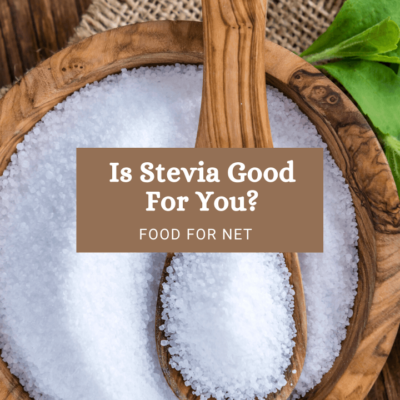









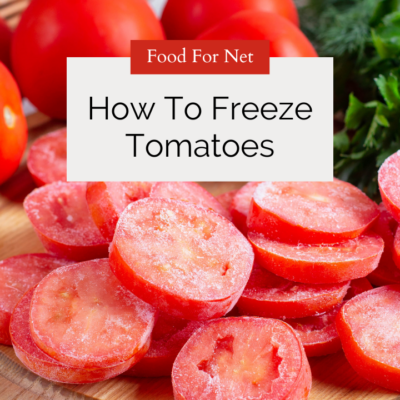


 12 Best Foods For COPD, Plus 6 Home Remedies To Fight COPD
12 Best Foods For COPD, Plus 6 Home Remedies To Fight COPD
Leave a Reply